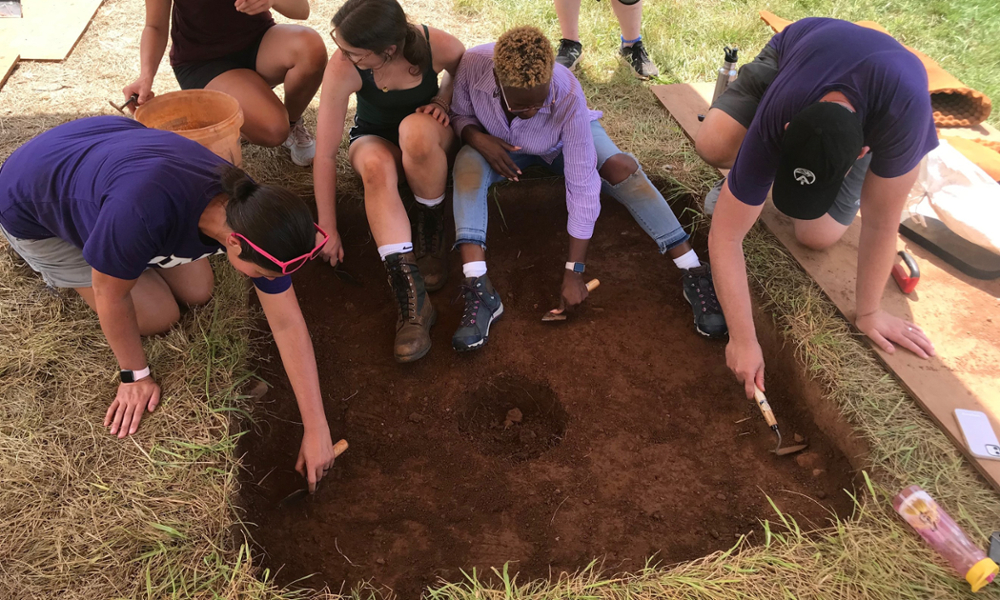Creating Inclusive and Antiracist Teachers Through Hands on Experience at James Madison’s Montpelier
College of Education
SUMMARY: College of Education’s Dr. Emma Thacker and Dr. Aaron Bodle take their students to James Madison’s Montpelier to participate in what students describe as a life-changing learning experience.
Creating Inclusive and Antiracist Teachers Through Hands on Experience at James Madison’s Montpelier
by Kara Myers
Over the last four years, College of Education’s Dr. Emma Thacker and Dr. Aaron Bodle have taken their students to James Madison’s Montpelier to participate in what students describe as a life-changing learning experience. Students spend a week on-site digging through layers of soil to find artifacts from the past. This opportunity challenges the students physically and emotionally. The weight of the site is heavy, and as the students dig through artifacts, they are faced with the harsh reality of the past history of the land as well as how we must all act against racism today.
Drs. Thacker and Bodle offer this course over the summer, where the first six weeks are online asynchronous activities, and the last week of the course is spent in Orange County, Virginia, at Montpelier. Aside from finding artifacts, touring the property, and attending class-like sessions, the students are always exploring and re-thinking. When asked to narrate a "typical" day on-site, Dr. Thacker and Dr. Bodle both describe a hefty day's work, where students are asked to exert themselves mentally and emotionally starting the minute they wake up. Dr. Bodle describes this feeling, "You're waking up in a room, that is not your own home, and then you are not only not in your own home, but you're in a very specific, very complex place. And I have found myself reflecting in those very quiet early morning hours about where I am, and what it means that I'll be spending my day there." The constant reflection only intensifies the more time that the students and professors spend on-site at Montpelier.
After interviewing students who participated in the archeological dig at Montpelier, they were all very grateful for this opportunity. Jacob Clark specifically mentioned how important this experience was when reflecting on his past education, "This is a graduate-level course and this is the first time that I have had holes in my educational gap filled with information that should have been taught in K-12 but wasn't." When interviewing these students, they all had unique takeaways from their time at Montpelier. Hannah mentions how it impacted her role as a student at James Madison University when she came back to campus and reflected on the name changes and new facilities that have taken place, "It is interesting to come back to JMU and see the Paul Jennings Hall, which has more meaning to me now because I understand more about Paul Jennings." Not only does this impact their roles as students, as Hannah Nimmo mentions, but it also impacts their roles as future elementary social studies teachers. These students also feel more comfortable teaching sensitive topics, as Megan Aldhizer mentions in her interview, "After going to Montpelier I really feel much better equipped to teach about hard topics in schools."
In addition to all of the benefits the archeological dig had on the students, such as gaining experience on how to teach in an honest way, it also challenged them. Megan reflected on her experience in her K-12 education and commented on the challenges the dig had on her past as a student and her future as an educator, "A common theme the entire week was knowing the whole truth and getting the whole story of the history. For me, really putting on a critical lens was challenging."
Dr. Bodle and Dr. Thacker knew the challenges that the students would face throughout this experience, especially the challenge of rethinking and questioning the history they thought they knew. Dr. Thacker comments on how this challenge prompts them to grow as individuals and as teachers, "I think that the constant rethinking is challenging for the students. Just learning more of the complexities of history." As students work through these challenges, they grow into more just, honest, and equitable teachers.
Dr. Thacker and Dr. Bodle are always looking for new ways to extend their work. If you are interested in learning more about this opportunity, please reach out to them.
